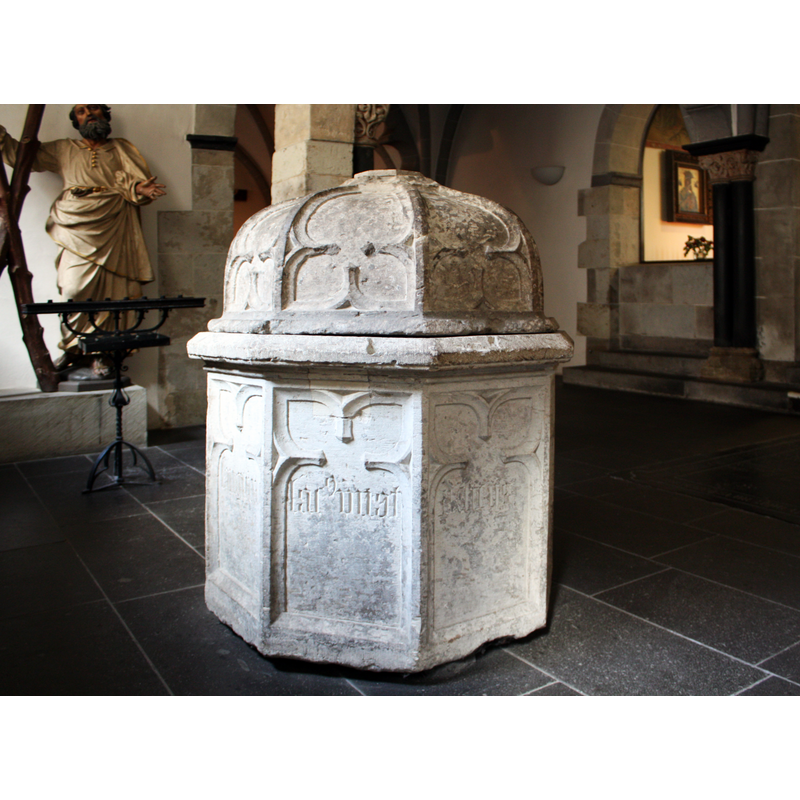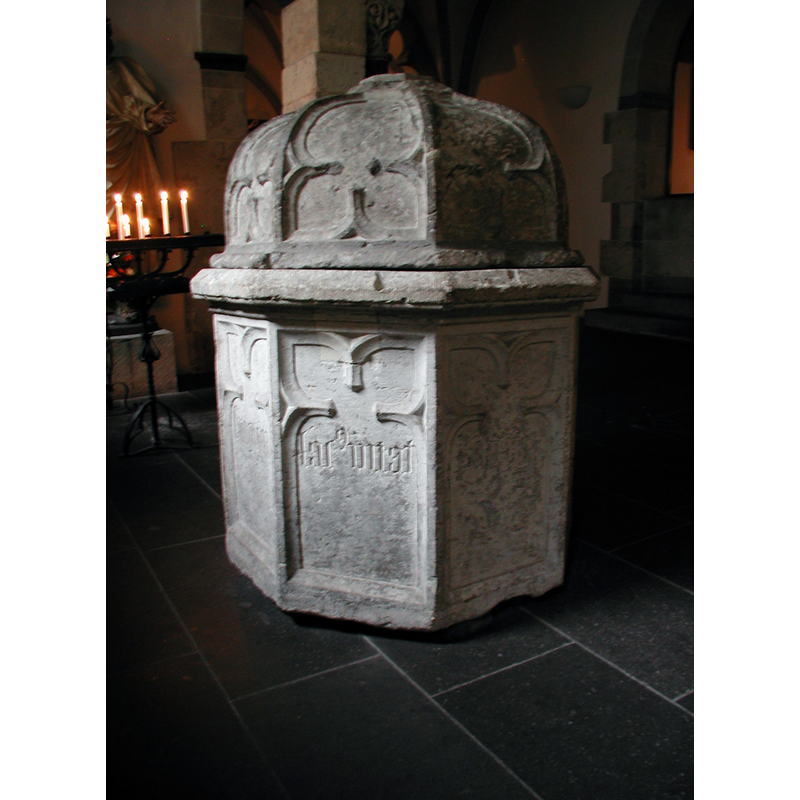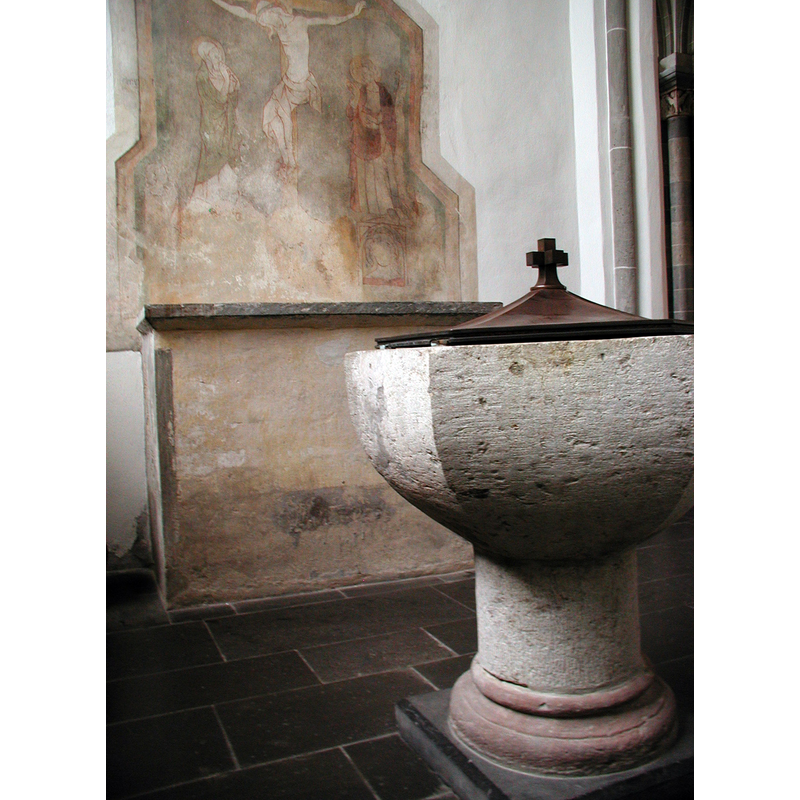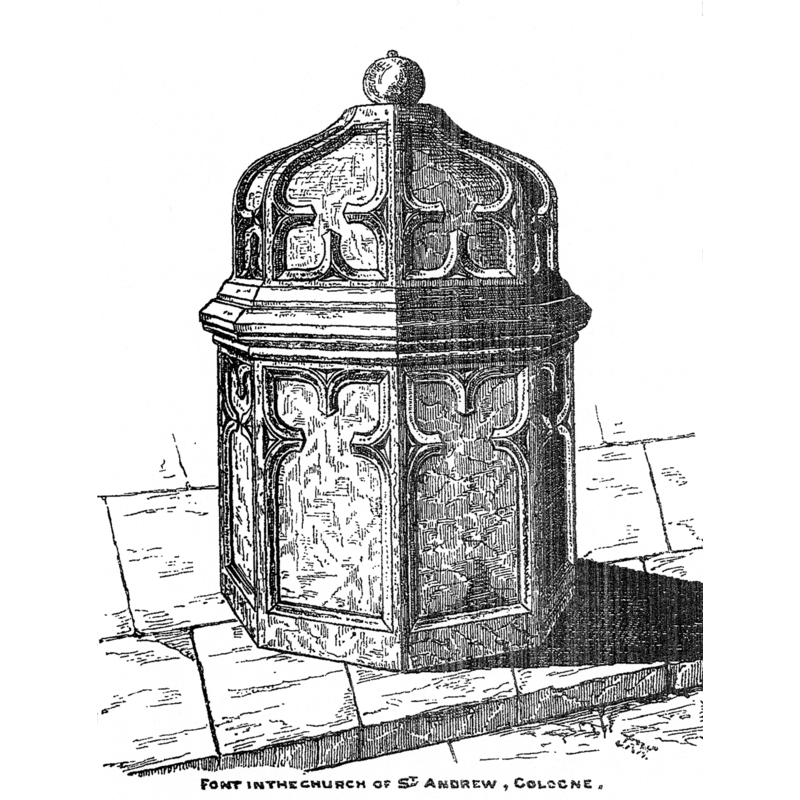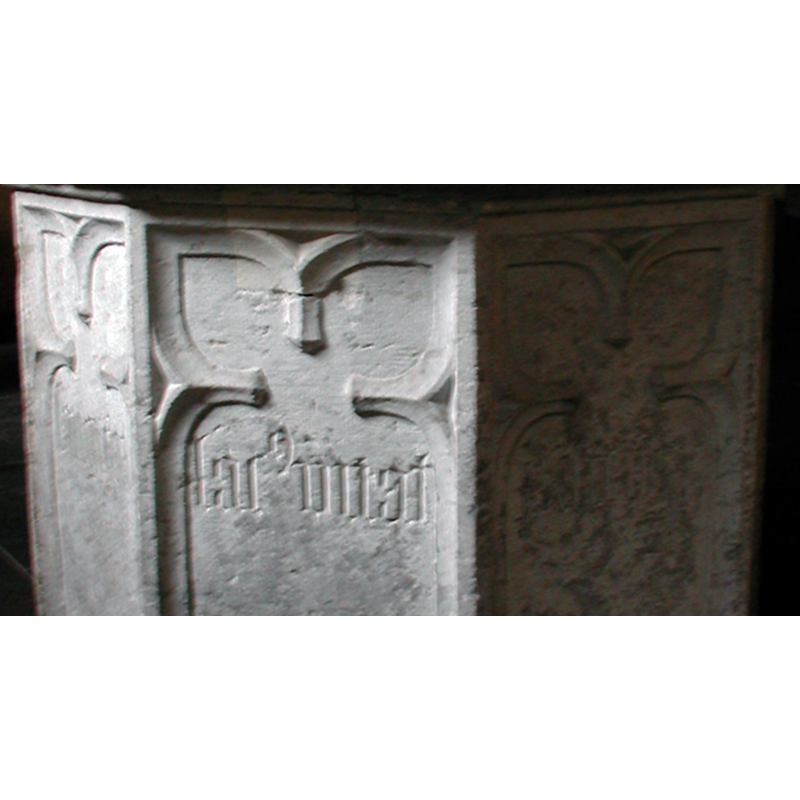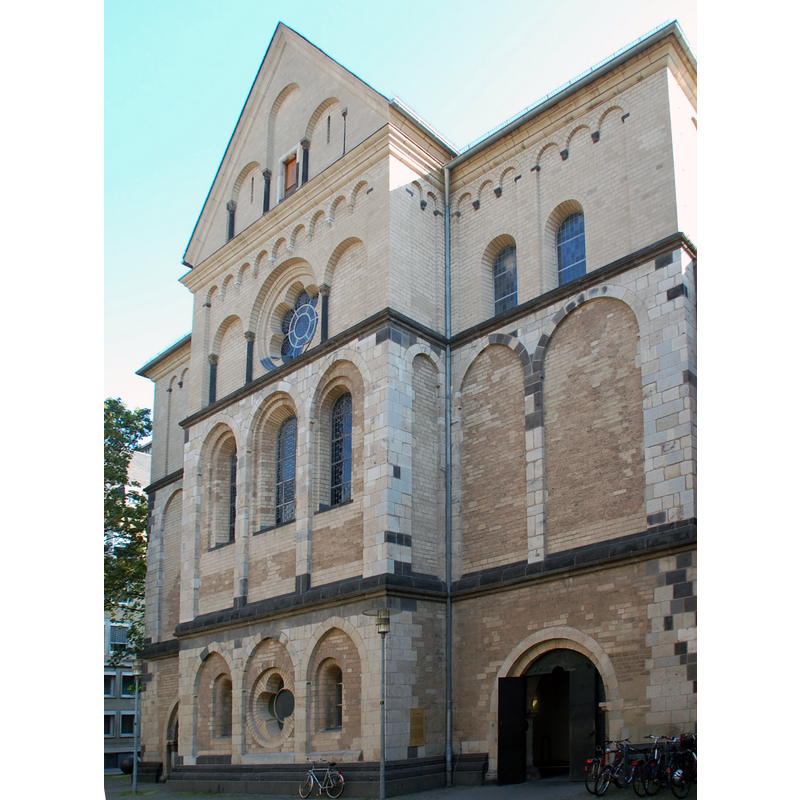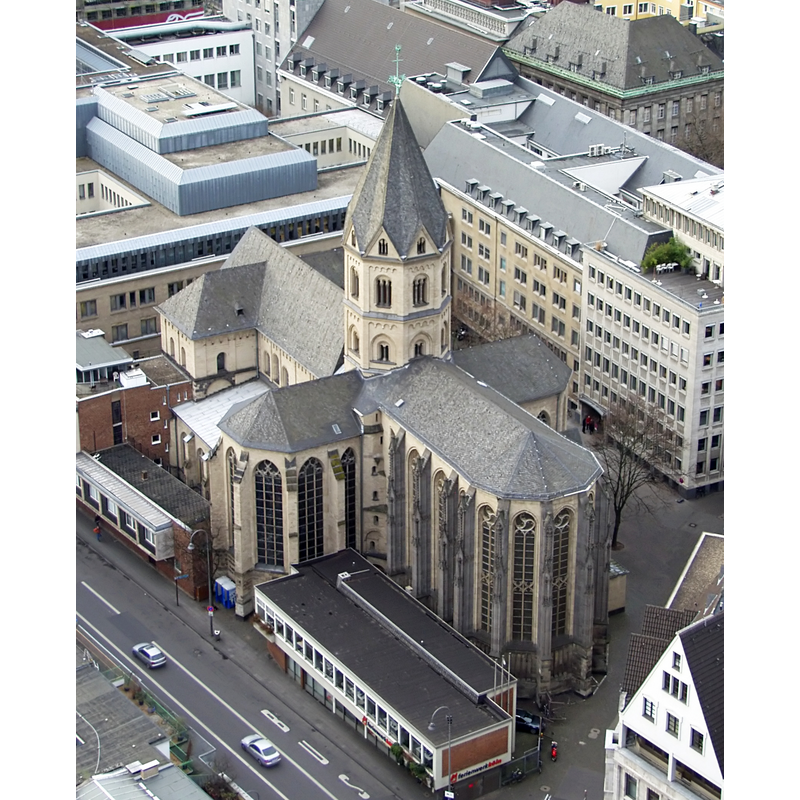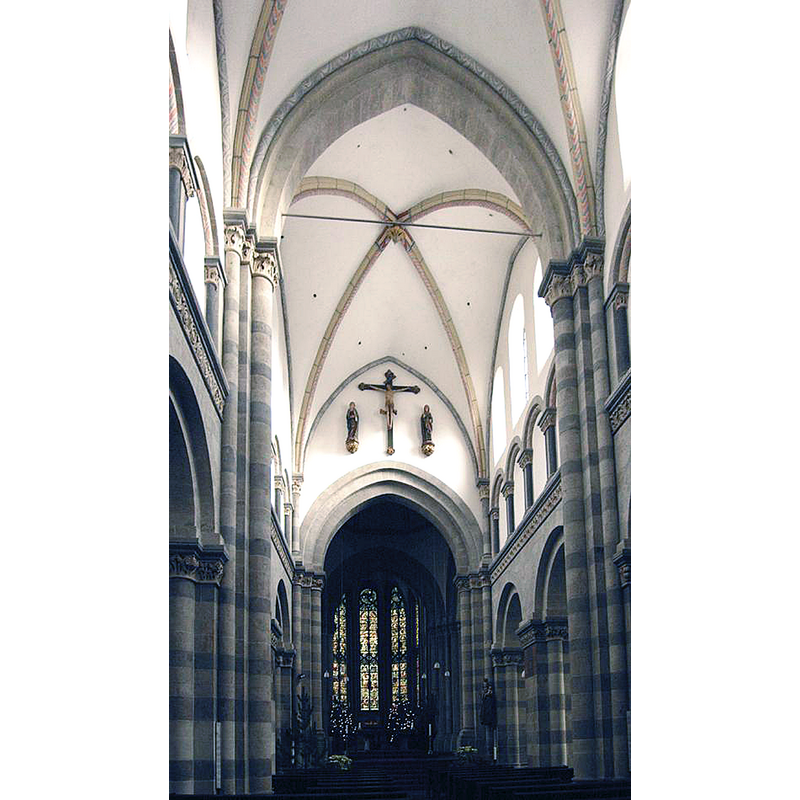Cologne No. 10 / Cologne / Colonia Agrippina / Köln / Koln
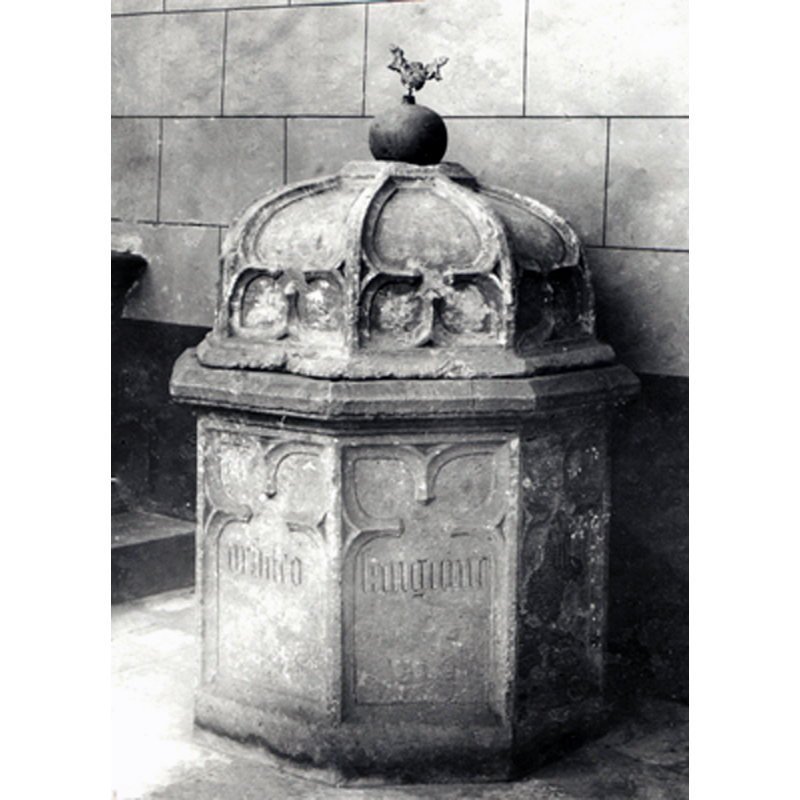
Image copyright © Förderverein Romanische Kirchen Köln e.V., 2019
No known copyright restriction / Fair Dealing
Results: 11 records
view of font and cover
Scene Description: the former reliquary -- notice the finial, here with another tip on the finial
Copyright Statement: Image copyright © Förderverein Romanische Kirchen Köln e.V., 2019
Image Source: digital image in Förderverein Romanische Kirchen Köln e.V. [www.romanische-kirchen-koeln.de/index.php?id=558] [accessed 16 October 2019]
Copyright Instructions: No known copyright restriction / Fair Dealing
view of font and cover in context
Scene Description: "Blutbrunnen": the old font; or, is it? formerly a reliquary; was it ever used as font? -- Source caption; "Der sogenannte „Blutbrunnen“, ein ehemaliges Reliquiar, steht im Zusammenhang mit dem Kult des Martyriums der 11000 Jungfrauen, der außer im Stift St. Ursula auch bei den Benediktinerinnen des Klosters zu den heiligen Machabäern besonders sehr ausgeprägt war."
Copyright Statement: Image copyright © Willy Horsch, 2008
Image Source: digital photograph taken 11 November 2008 by Willy Horsch [https://commons.wikimedia.org/wiki/File:Blutbrunnen-MachabäerklosterAnfang-16-Jh-Heute-St-Andreas-Köln.jpg] [accessed 16 October 2019]
Copyright Instructions: GFDL / CC-BY-3.0
view of font and cover in context
Scene Description: "Blutbrunnen": the old font; or, is it? a reliquary?
Copyright Statement: Image copyright © Willy Horsch, 2007
Image Source: digital photograph taken 30 November 2007 by Willy Horsch [https://commons.wikimedia.org/wiki/File:Köln-St-Andreas-Vorhalle-108.JPG] [accessed 16 October 2019]
Copyright Instructions: GFDL / CC-BY-3.0
view of font and cover in context
Scene Description: the modern font in use
Copyright Statement: Image copyright © Willy Horsch, 2007
Image Source: digital photograph taken 30 November 2007 by Willy Horsch [https://commons.wikimedia.org/wiki/File:Köln-St-Andreas-Taufbecken-Fresko-094.JPG] [accessed 16 October 2019]
Copyright Instructions: GFDL / CC-BY-3.0
view of font and cover
inscription
Copyright Statement: Image copyright © Willy Horsch, 2007
Image Source: edited detail of a digital photograph taken 30 November 2007 by Willy Horsch [https://commons.wikimedia.org/wiki/File:Köln-St-Andreas-Vorhalle-108.JPG] [accessed 16 October 2019]
Copyright Instructions: GFDL / CC-BY-3.0
design element - motifs - quatrefoil - 8
view of church exterior - west façade
Copyright Statement: Image copyright © Achim Raschka, 2011
Image Source: edited detail of a digital photograph taken 25 September 2011 by Achim Raschka [https://commons.wikimedia.org/wiki/File:Köln_St._Andreas_02.jpg] [accessed 16 October 2019]
Copyright Instructions: GFDL / CC-BY-SA 4.0
view of church exterior in context - southeast view
Scene Description: view from the south tower of the cathedral
Copyright Statement: Image copyright © Raimond Spekking, 2008
Image Source: digital photograph taken 8 January 2008 by Raimond Spekking [https://commons.wikimedia.org/wiki/File:St._Andreas_Köln_von_oben.jpg] [accessed 16 October 2019]
Copyright Instructions: CC-BY-SA-4.0
view of church interior - looking east
Copyright Statement: Image copyright © Hans Peter Schaefer, 2005
Image Source: digital photograph taken 6 January 2005 by Hans Peter Schaefer [https://commons.wikimedia.org/wiki/File:Koeln_st_andreas_innenraum.jpg] [accessed 16 October 2019]
Copyright Instructions: GFDL / CC-BY-SA-3.0-migrated
INFORMATION
Font ID: 14564COL
Object Type: Baptismal Font1?
Font Century and Period/Style: 14th century / 6th centuryre-cycled?], Late Gothic
Church / Chapel Name: St. Andreas Kirche
Font Location in Church: Inside the church
Church Patron Saint(s): St. Andrew
Church Notes: 10thC church consecrated 974 on the site of an earlier church or chapel known as 'St. Matthaeus in fossa' and dedicated to St Matthew
Church Address: Komödienstraße 111, 50667 Köln Altstadt-Nord, Germany
Site Location: Köln, Nordrhein-Westfalen, Germany, Europe
Directions to Site: Located just W of the Cathedral / Dom, in the Innenstadt
Ecclesiastic Region: Erzbistum Köln
Additional Comments: re-cycled font? (believed to have been formerly a reliquary -- was it really used as font?)
Font Notes:
Click to view
Noted and illustrated in Walker (1883): "The font [...] is peculiar, and of second Pointed date". The font is octagonal, of the single-volume type, with no distinction between basin and base, the sides decorated with large quatrefoil panels, the upper two foils pointed; the font cover is a medium dome, also octagonal and matching in reverse the decoration of the font itself, with a ball finial. The [some of?] sides of the font have an inscription on them carved in Gothic lettering [text not available]. Walker's 'font' is actually described elsewhere, Förderverein Romanische Kirchen Köln e.V. [www.romanische-kirchen-koeln.de/index.php?id=558] [accessed 16 October 2019] thus: "Sogenannter Blutbrunnen. Anfang 16. Jahrhundert. Aus dem 1802 aufgehobenen Benediktinerinnenkloster zu den heiligen Machabäern. Dieses ursprünglich für die Machabäerkirche angefertigte Reliquiengefäß, der sogenannte Blutbrunnen, steht nun in der Vorhalle von St. Andreas. Er soll angeblich das Blut der elftausend Jungfrauen aus dem Gefolge der heiligen Ursula aufgenommen haben und steht im Zusammenhang mit dem Jungfrauenkult, der außer im Kanonissenstift St. Ursula auch im Benediktinerinnenkloster zu den heiligen Machabäern besonders gepflegt wurde. Er gehört mit dem ebenfalls in St. Andreas erhaltenen Machabäerschrein (1520 – 1527) zu den Ausstattungsstücken, die der Humanist und Beichtvater der Nonnen Helias Mertz (gest. 1527) in Auftrag gegeben hatte. Das achteckige steinerne Gefäß ist ca. 1,35 m hoch und mit Blendmaßwerk geschmückt. Abgeschlossen wird es durch einen hochgewölbten Deckel mit einer kleinen Öffnung. Schon durch seine Größe handelt es sich um ein ungewöhnliches Beispiel eines spätmittelalterlichen Reliquiengefäßes." A 2007 photograph shows no finial on the cover. The old 'font' appears to be no longer is use if it ever was; there is another baptismal font in use, a square basin with a rounded underbowl raised on a cylindrical pedestal base; the lower base is moulde but the rest of the font is plain. The font cover is square with a slight raise in the centre where the cross finial stands.
COORDINATES
UTM: 32U 356252 5645331
Latitude & Longitude (Decimal): 50.941667, 6.953889
Latitude & Longitude (DMS): 50° 56′ 30″ N, 6° 57′ 14″ E
MEDIUM AND MEASUREMENTS
Material: stone
Number of Pieces: one
Font Shape: octagonal, mounted
Basin Interior Shape: round
Basin Exterior Shape: octagonal
INSCRIPTION
Inscription Location: on [some of] the sides of the font
Inscription Notes: [cf. FontNotes]
LID INFORMATION
Apparatus: no
Notes: [cf. FontNotes]
REFERENCES
- Walker, J. Russell, "Notes on Continental Churches", (1883), Proceedings of the Society of Antiquaries of Scotland, 1883, pp. 49-75; p. 66 and fig. 6
